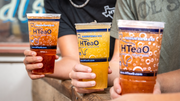Operations
Why sustainability is important, successful year-round in foodservice
It's Earth Month, and operators may have a heightened focus on sustainability, but evolving economic and consumer trends make eco-friendly practices an essential year-round commitment in the foodservice industry.

April 1, 2024 by Jamil Bouchareb — CEO and Founder, Restaurantware
While Earth Month may spark a heightened focus on sustainability, evolving economic and consumer trends make eco-friendly practices an essential year-round commitment in the foodservice industry. With escalating food costs driven by inflation and the upward trajectory of conscious consumerism, the foodservice sector finds itself at a critical juncture for an industry-wide pivot towards a reduced environmental footprint to maintain success in the current market.
A thorough analysis of the industry landscape is crucial for identifying the most effective and profitable sustainability-focused strategies. Foodservice operators have a wealth of options for boosting conservation efforts, ranging from adopting alternative packaging solutions to incorporating sustainable menu items. Opting for these green practices not only enhances their environmental footprint but also aligns with the values of the increasingly large demographic of eco-conscious consumers.
Adoption of food waste reduction strategies
The foodservice sector plays a significant role in contributing to global solid waste, generating waste at both the pre-consumer and post-consumer stages. Pre-consumer waste arises from unsold food and preparation leftovers, while post-consumer waste includes uneaten food and discarded packaging from customers. The impact of this waste is far-reaching, leading to increased carbon emissions, depletion of natural resources, and higher operational costs for businesses.
With food costs accounting for approximately 25-28% of a restaurant's total revenue and around one-third of all food produced globally going to waste, the push for waste reduction is not only an environmental imperative but also a critical economic strategy. The adoption of waste reduction methods offers substantial financial benefits, potentially yielding $8 in return for every $1 invested in minimizing food waste. This highlights the economic and environmental advantages of integrating sustainable practices within the foodservice industry.
Engaging Generation Z consumers
The importance of sustainability resonates deeply among Generation Z consumers, with a third of the demographic citing it as a critical factor in their purchasing decisions. Poised to surpass the purchasing power of prior generations by 2030, this demographic's preferences underscore the imperative for foodservice operators to weave sustainability into the fabric of their business strategies. Indeed, recent surveys reveal that 56% of consumers favor dining establishments that feature sustainable menu options, suggesting that visible commitments to sustainability can profoundly shape dining decisions.
By enhancing recycling and composting practices, refining inventory management to minimize food waste, and phasing out detrimental single-use products in favor of eco-friendly alternatives, foodservice businesses can make their sustainability efforts more apparent and appealing to customers. Such strategies not only contribute to waste reduction but also help in building stronger brand loyalty among increasingly environmentally conscious consumers.
Leveraging technological innovations
The emergence of innovative technologies offers remarkable opportunities for the foodservice industry to bolster its commitment to environmental stewardship. For businesses aiming to pinpoint improvement areas and adopt data-driven approaches for optimizing waste management, investing in waste tracking software or mobile applications is a strategic move. These tools enable operators to closely monitor waste generation, understanding patterns and identifying the most impactful waste reduction strategies tailored to their operations.
The sustainable packaging sector is experiencing rapid growth, presenting a market opportunity worth $12.5 billion for plastic alternatives. Among these alternatives, plant-based materials like bagasse — free from PFAs — and compostable, biodegradable palm leaf stand out for their versatility, offering an array of products that serve as easy replacements for traditional plastic items. Adopting such sustainable tableware and utensils not only reflects a business's commitment to environmental sustainability but also meets the consumer demand for healthier and eco-friendlier dining experiences.
Additionally, advancements in waste-to-energy technologies, such as anaerobic digestion and incineration, offer promising avenues for converting organic waste into valuable resources like biogas, heat, and electricity. Foodservice operators have the option to either directly invest in these technologies or forge partnerships with local waste-to-energy facilities. This approach reduces the volume of waste sent to landfills while also harnessing renewable energy from otherwise discarded resources.
The integration of sustainability into the operational ethos of the foodservice sector is not merely a response to external pressures; it is a strategic imperative for long-term success. By adopting comprehensive waste management practices, whether that be source reduction, recycling, composting, or waste-to-energy initiatives, businesses can minimize their environmental footprint while positioning themselves as leaders in the transition to a more sustainable and resilient foodservice industry.
About Jamil Bouchareb
Jamil Bouchareb is the founder and CEO of Restaurantware, a foodservice supply company at the forefront of innovation in the industry. Jamil's goal since founding Restaurantware in 2010 has always been clear: to create products that chefs and operators could be proud of, emphasizing sustainability and ingenuity. Under his astute leadership, the company's product catalog has surged by an extraordinary 125% within a mere two-year span, encompassing over 8,000 diverse SKUs.
 ChatGPT
ChatGPT Grok
Grok Perplexity
Perplexity Claude
Claude








